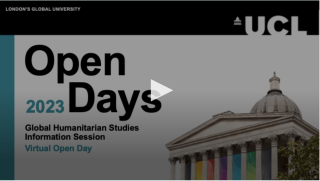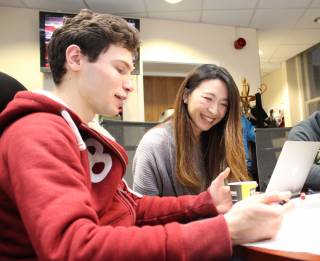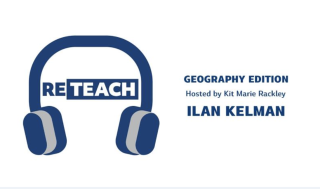This exciting multidisciplinary programme aims to educate and train future generations of humanitarian leaders in the theory and practice of humanitarian action.
Why study with the Institute for Risk and Disaster Reduction?
As a student in the Institute for Risk and Disaster Reduction (IRDR) you will benefit from learning in a truly multidisciplinary environment. Staff and students in the IRDR come from a range of backgrounds and our research crosses traditional boundaries to produce innovative results. As well as your timetabled teaching, we have an active seminar series on international development, specialised masterclasses, high-profile public meetings and networking events with senior policymakers, UN managers and front-line workers.
Our staff are leaders in their field and course content is informed by the cutting-edge research taking place in the department. The IRDR is featured regularly in global press and media outlets, providing commentary a wide range of risk and disaster reduction subjects, including most recently the Coronavirus pandemic, extreme weather and storms, and flooding and flood risk.
Programme structure
You will study this course full time over three years. You will take a compulsory central core of humanitarian studies running through all three years with optional modules from within the department and our partner departments. The compulsory central core comprises five 15-credit taught modules in years one and two and, in year three, three-15 credit taught modules and 30 credits from the independent research project. The remaining 45 credits each year is comprised of optional taught modules. You can select modules from your chosen specialism and humanitarian affairs, which provide both breadth and depth according to your interests. You'll be able to find out more about the different specialism modules during the first few weeks of the programme, with plenty of support to help you choose the ones that are right for you.
There are 150 study hours per module, totalling 1200 hours per year. For a taught 15 credit module you will spend about 20 hours in lectures, 20 in practicals, seminars, tutorials, fieldwork, and the remainder in independent study (approximately double for a 30 credit module).
You can find out more about the structure of the programme in the UCL Prospectus.
Compulsory modules
Please note these modules are indicative and may be subject to change. You can find more details about module content, including assessment methods, in the UCL Module Catalogue.
Year 1
- IRDR0018 Global History of Humanitarianism
This module introduces international humanitarian history since the foundation of the International Red Cross and Red Crescent movement in 1863 through to the Indian Ocean Tsunami in 2004 and the Rohingya Exodis. Lectures will examine key events and ideas that have shaped the system, including: the Geneva Conventions, humanitarian politics of the 1967 Biafran war, and the international system’s successes and failures in response to the 2004 Indian Ocean Tsunami. Seminars and tutorials will be used for discussion groups and feedback sessions.
- IRDR0019 Humanitarian Crisis Response
Since the Second World War the international community has evolved a complete system for responding to major humanitarian emergencies, coordinated by United Nations agencies. This module will explain the structure and dynamics of the relief system and the challenges it faces during crises and disasters. It will enable students to become familiar with the major issues and trends associated with modern humanitarianism and the methodologies used when responding to disasters. Examples will illustrate the principal challenges and achievements in the field. The module will combine practical, theoretical and ethical approaches to humanitarian action. Standards, norms and protocols will be discussed. So will the relationship between non-governmental organisations and government-sponsored aid. Relief appeals and the donor system will be covered in this module.
- IRDR0020 Climate and Natural Hazard Risks
This module introduces the concepts of hazards, vulnerability, marginalisation, risk, resilience, adaptation and disaster and how they integrate will be discussed. It will address strategies for reducing the impacts and the likelihood of disasters in fragile areas. It will help students to understand social, economic, ecological, institutional, cultural and physical impacts of climate change and natural hazards on vulnerable populations in different environment settings and conflict affected states around the world.
- IRDR0021 Statistical and Geospatial Data Analysis
This module will help students to familiarise with a range of statistical techniques in order to understand and analyse data used in humanitarian studies. They will be able to apply the acquired skills through the analysis of both quantitative social survey data (collected through interviews and questionnaires) and spatial data (satellite images, and ordnance survey maps). At the end of the module, the students will be able to design and implement quantitative research, communicate statistical outcomes competently, link research questions and statistical techniques, and visualise results (maps, tables, and diagrams) from data analyses.
- IRDR0023 Evaluation of Humanitarian Action
This module aims to equip you as a student with the knowledge and skills to analyse and engage with contemporary issues in the theory and practice of humanitarian action. You will learn methods for monitoring and evaluating humanitarian action in contexts such as international development, environmental and climate change and in conflict zones. Learning will be based on practical examples and scenarios of humanitarian action and international development that feature collaborative research and practice.
Year 2
- IRDR0040 Historical and Contemporary Perspectives on Conflict and Migration
This module analyses historical and contemporary perspectives on forced migration and the range of theories on conflict and violence that causes these events. Lectures will examine key events and ideas that have contributed to forced migration, including: the Rohingya Exodus, the Syrian civil war, the conflict in South Sudan, and longer historical perspectives from the Second World War and the Partition of India. The issues of gender-based violence and human trafficking will be examined. Seminars and tutorials will be used for discussion groups and feedback sessions.
- IRDR0038 Humanitarian Planning and Logistics
The challenge of humanitarian assistance is the physical deployment of goods and personnel. National and international disaster relief, as well as other forms of crisis management such as peacekeeping missions, have to assure the development and maintenance of their lifelines of supply. This module addresses these issues through scenario-based workshops supported by seminars focusing on disaster preparedness and response, but also introducing the role of sustainable logistics in the transition to recovery. Water, sanitation and hygiene issues will be addressed.
- IRDR0039 Humanitarian Policy
This module will provide students with an introduction to the global humanitarian policy making process. Each year the module will focus on one of the major global humanitarian frameworks (e.g. Sendai Framework for DRR; SDGs; World Humanitarian Grand Bargain; etc). Lectures, including guest speakers, and visits to organisations within the humanitarian sector which will provide students with a solid background to humanitarian policy. Students will interact directly with those who have been/are involved in global humanitarian policy development to get a ‘behind the scenes’ view of the process.
- IRDR0041 Qualitative Research Methods
The aim of this module is to introduce students to qualitative research methods and methodological frameworks. As a student on this module, you will learn about the following topics through lectures, seminars and discussions: what is qualitative research, the difference between epistemology and ontology, and the relevance of positionality. You will also be introduced to different methods and methodological frameworks, including Grounded Theory, Standpoint Theory and Ethnography. This module will also provide you with an opportunity to learn about practical aspects of conducting qualitative research, including designing research questions, identifying appropriate research methods, learning about sampling, understanding dos and don’ts of qualitative data collection and fieldwork, coding for qualitative studies, and data analysis. After completion of this module, you will have a better understanding of qualitative research methods and how to apply them to your own research projects.
Recommended reading
- Denzin, N.K. and Y.S. Lincoln. (eds.) (2005) Handbook of Qualitative Research. London: Sage.
- Leavy, P. (ed.) (2014) The Oxford Handbook of Qualitative Research, Oxford Library of Psychology, Oxford: Oxford University Press.
- IRDR0034 International Legal Framework for Humanitarian Action
This module explores the international legal framework within which humanitarian action operates. The framework comprises different branches of international law, including international humanitarian law, human rights law, refugee law, environmental law, criminal law, and (emerging) international disaster response law. This module will provide an introduction to these branches of international law to the extent they are relevant to humanitarian action. The module will examine a broad variety of issues, such as access to humanitarian assistance, forced migration, climate change, and protection of persons in the event of disasters and armed conflict. By the end of this module, you will learn about key documents, cases, and actors that define contemporary international law relating to humanitarian action.
Year 3
- IRDR0037 Humanitarian and Aid Economics
This module addresses the key theories and debates in the broader fields of development and conflict economics and will move to an examination of the political economy of humanitarian aid. Students will have an increased ability to critically evaluate the economic policies of humanitarian actors and recommend alternative approaches and equip them with policy-relevant skills and expertise.
- IRD0048 Violence, Intersectionality and Marginalisation
This module will provide students with an introduction to intersectionality and a critical understanding of how the concept can be deployed to analyse structural violence and marginalisation. We will approach these critical debates in diverse humanitarian contexts building from case study examples and real-life scenarios from different parts of the world and disaster vulnerable countries and contexts.
"The film project was possibly one of, if not my most favourite assessment I have had at university. It was really fun being able to make this film as a group, and even more fun getting to see everyone's today at the showcase. I am extremely proud of the work we produced, and I think this module has actually helped me realise what type of work I want to go into post university (documentary or the making of educational material for social issues!)... thank you for picking such as fun assessment method." Harry, BSc student
- IRDR0029 Programme Management for Humanitarians
This module provides you with a range of transferable core skills necessary to design and manage humanitarian programmes and projects. You will be introduced to the general project management phases of planning, inception, management and closure. Phases specific to humanitarian programmes will also be introduced, including situation and need assessment, and monitoring and evaluation. Managing people in teams and operating within institutional or organisational frameworks will also be emphasised.
- IRDR0025 Independent Humanitarian Research Project
The independent research project culminates in a 5,000 word dissertation and poster presentation. Projects may be field, theory or modelling based and can be conducted in collaboration with external industry or NGO partners.
Optional modules
You can find more details about module content, including assessment methods, in the UCL Module Catalogue.
IRDR optional modules
Year 1
IRDR0022 Key Concepts and Debates in Humanitarianism
IRDR0024 Technology for Humanitarian Action
IRDR0027 Global Health Introduction
IRDR0032 Key Concepts in Social Anthropology
Year 2
IRDR0030 Microeconomics for Humanitarian Contexts
IRDR0031 Kinship, Ethnicity and Gender
IRDR0042 Humanitarian Engineering and Data Science
Year 3
IRDR0028 Water Security, Crises and Sustainability
IRDR0033 International Migration Law
IRDR0036 Anthropological theory
IEHC0069 Research methods for Humanitarian Contexts
Optional modules in other departments
Students can select non-IRDR thematic optional modules. Please note some modules in other departments have a cap on student numbers, pre-requisites, or timetable restrictions and therefore may not be available for all students. You will fnd out more at our module selection sessions during induction but if you have a query in the meantime, please contact irdr-education@ucl.ac.uk.
Year 1
STAT0002 Introduction to Probability & Statistics
BASC0040 Logic, Computation and Language Theory
MSIN0048 Understanding Management
MSIN0003 Communication and Behaviour in Organisations
IEHC0028 Research Methods in Population Health
Year 2
STAT0003 Further Probability & Statistics
BASC0038 Algorithms, Logic and Structure
MSIN0059 Managerial Accounting for Decision Making
Year 3
MSIN0147 Strategic Project Management
GLBH0005 Global Communicable and Non-Communicable Diseases
GLBH0006 Global, Maternal & Child Health
Some modules in other departments have a cap on student numbers or pre-requisites and therefore may not be available for all students. We also cannot guarantee that there will not be timetable clashes.
Meet the team
Our teaching team includes lecturers from across the department. Find out more on our People page.
 | Dr Lisa Guppy, Programme LeaderHi! I'm Dr Lisa Guppy and I am the Programme Leader and I also teaching on the programme. I have worked across humanitarian, peace and development fields, primarily United Nations organisations, across Asia, Africa, North America and the Middle East. |
 | Dr. Mohammad Shamsudduha (“Shams”), Undergraduate TutorHello! I am Dr. Mohammad Shamsudduha but everyone calls me Shams. I am the Undergraduate Tutor for the BSc, which means I'm here to help students with all things academic, and I teach the Climate and Natural Hazard Risks and the Humanitarian Data Science modules. I am a geoscientist by academic background and my research is centred around earth’s water resources, environment, and people. I look forward to meeting you all at the start of term! Read more about Shams in this interview on the MAPS faculty website. |
 | Dr Shipra Jain, Admissions TutorI am Dr Shipra Jain, the admissions tutor for the BSc. I am responsible for overseeing the admissions process, from talking to prospective students to ensuring applications are dealt with efficiently. You'll meet me at our online events and open days. |
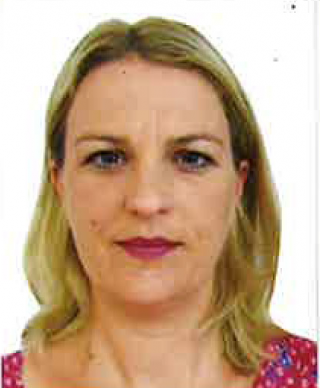 | Nicola Jordan, Work Placements ManagerHi! I'm Nicola and I work with students to support them undertaking a voluntary internship during their BSc studies. I can also help with some of the employment skills you'll need to get you job-ready at the end of your degree programme.
|
Careers and employability
This programme was created to help professionalise the humanitarian sector. Teaching and module content is based on consultation with global and national employers, and the key skills you will acquire will prepare you for you future humanitarian career, whichever specialism you choose.
Between the second and third years, we will use our extensive networks to help facilitate an optional four-week summer placement, in the UK or internationally, to help you connect your academic learning with skills in the humanitarian workplace.
Find out more about our student placements.
We also hold an annual Careers Discovery Evening to give you an insight into working in the sector and introduce you to some key employers. This is a great place to start looking for internship hosts too!
UCL was ranked in the top 20th in the world in the 2022 QS Graduate Employability Rankings for graduate employability, placing us 3rd in the UK and 1st in London.
Frequently asked questions
- What is humanitarianism?
Humanitarianism means different things to different people, groups and organisations. For many, humanitarianism is about saving lives, reducing suffering and improving the conditions that people are living in.
At the international level, humanitarianism is associated with the United Nations, governments and non-governmental organisations undertaking life-saving interventions during conflicts and disasters. But humanitarian action can also include practices of relief and care undertaken by ad hoc and unskilled individuals and groups, such as local volunteers.
To study humanitarianism requires examining responses to conflict, disasters, climate change, pandemic and other emergencies from a range of different perspectives and using lenses and tools from a range of different disciplines, as the problems and solutions relating to crisis are multidimensional.
- How do I choose my optional modules on the Global Humanitarian Studies BSc?
The main advice we give is to choose what interests and excites you! Take a look at the module information, read around the topic of humanitarianism online, and get advice from staff during induction.
While you have to choose your optional modules when you apply to the degree, you will have the opportunity to change in the first two weeks or so of the programme, after a discussion with the Departmental Tutor.
Over the course of your degree you’ll also have access to the numerous seminars, talks and events put on by IRDR and other parts of UCL.
- How does a Global Humanitarian Studies degree differ from International Development Studies?
Humanitarianism is different from international development as it refers to efforts to save lives and reduce suffering primarily after an emergency, like a conflict or disaster. International development aid tends to focus on longer term structural change in a society, with or without an emergency—for example the alleviation of poverty or improving the governance. However, humanitarianism and international development are not two distinct forms of action; emergency relief and development aid can complement, overlap, transition into each other, or even undermine each other.
Humanitarian Studies as an academic area is a relatively new field of study that has grown in significance and impact since the 1990s. While it builds on theories and approaches from other areas, like International Development or Security, Humanitarian Studies has its own unique set of thinkers, approaches, dilemmas and questions, that focus primarily on the policy, practice, theory and ethics of relief during and after a crisis.
Check out the United Nations’ latest humanitarian case studies on their “Centre for Humanitarian Data” website to see what current humanitarian crises are in focus: https://centre.humdata.org/category/case-study/
- How does a Global Humanitarian Studies degree link to Geography and other social science subjects?
The BSc in Global Humanitarian Studies does not replace single discipline degree programmes, such as Geography. Instead, it draws on relevant literature, debates and learning tools from these disciplines, and combines the most relevant, in order to tackle the multidimensional questions within Humanitarian Studies.
Students on the BSc will therefore have the chance to engage with a range of topics familiar to geographers, while learning about how other disciplines approach these questions. Topics might include:
- vulnerability (e.g. what makes populations vulnerable to particular crises in different locations around the world?)
- resilience (e.g. how can populations be supported to adapt and “bounce back” from crises?)
- urbanisation (e.g. how is the expansion of megacities affecting vulnerability and the ability of humanitarian organisations to respond?)
- borders (What role do borders and boundaries – whether political or natural – play is crisis response?)
- decolonisation (e.g. how have racism and legacies of colonialism shaped - and are still shaping - the aid industry?)
- How does a Global Humanitarian Studies degree link to Maths and other Science subjects?
The BSc in Global Humanitarian Studies does not replace single discipline degree programmes, such as Mathematics. Instead, it draws on relevant literature, debates and learning tools from these disciplines, and combines the most relevant, in order to tackle the multidimensional questions within Humanitarian Studies.
Students on the BSc will therefore have the chance to engage with a range of topics familiar to mathematicians, while learning about how other disciplines approach these questions. Topics might include:
- Geospatial analysis (e.g. how to use mapping technologies to understand a hazard risk or humanitarian need?)
- Data analytics/Big data (e.g. how can data innovations improve the effectiveness of emergency responses).
Find out more
Find out more about the course, fees and funding, teaching and assessment on our course information page.
You can ask our staff and students questions about life in the department at one of the UCL open days or chat to a current student on Unibuddy.
Student work
These policy briefs were created by groups of students as part of the Humanitarian Policy (IRDR0039) module. Projects like these help students refine their group work, research and communication skills and the proposals they put forward could have real-world impact.
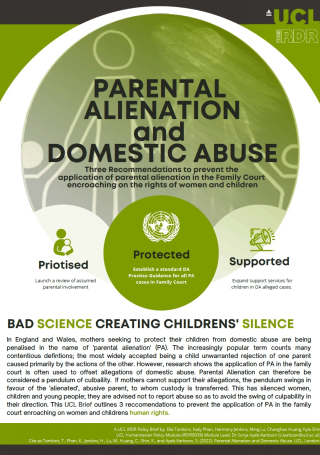 | 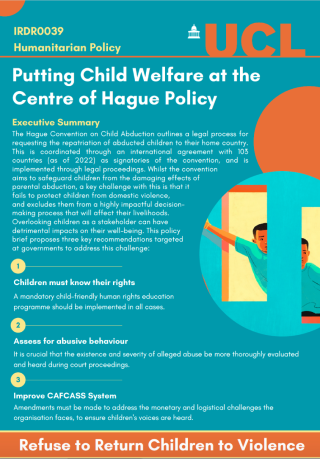 | 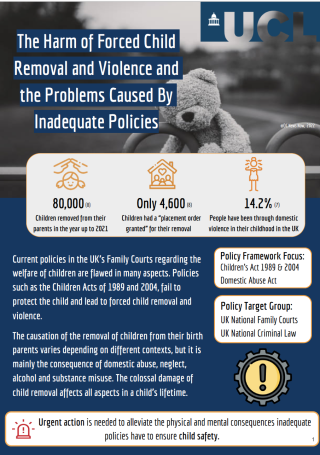 |
'Parental alientation and domestic abuse' | ‘Putting child welfare at the centre of Hague policy’ | 'The harm of forced child removal and violence and the problems caused by inadequate policies’ |
IOM DTM – UCL IRDR Environmental Displacement Hackathon
On the 5th of June 2023, the UN International Organization for Migration's (IOM) Displacement Tracking Matrix (DTM) team in London hosted its first hackathon event in collaboration with UCL’s Institute for Risk and Disaster Reduction (IRDR). The event focused on team problem-solving and analysis to help tackle global questions on environmental and natural hazard related displacement. It encouraged student participants to utilise their GIS, quantitative methods and/or data visualisation skills to develop new ideas, as well as gain first-hand insight into how data is collected and used in emergency contexts, humanitarian crises, and responses.
As the winners of the hackathon, Jasmine Andean, and Melanie Larre, both pursuing a Global Humanitarian Studies undergraduate degree at UCL, had the opportunity to develop their hackathon idea further together with DTM London from August to September. Their research focused on a comparative analysis between media reports of floods and DTM’s Emergency Tracking Tool (ETT) data on internal displacement driven by flooding in Burundi in 2021. Their aim was to determine whether there were differences in the relationship between the severity of an event and the resulting internal displacement across affected locations.
Read the full article on the DTM website and watch their video about the research and their experiences:
 Close
Close


